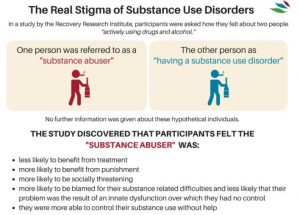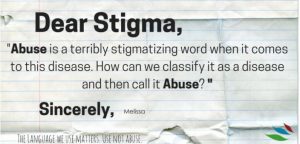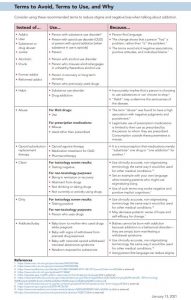Mar
04

Posted by Susan Halpin on March 4th, 2021
Posted in: Blog, Patient Engagement, Public Health
Tags: Stigma, substance use disorder language

Did you know that illicit drug use disorder is the most stigmatized health condition in the world and alcohol use disorder was ranked not far behind as fourth in the world? https://www.ncbi.nlm.nih.gov/pmc/articles/PMC3353607/
A study was conducted by the Recovery Research Institute that asked participants how they felt about two people “actively using drugs and alcohol”.
One person was referred to as a “substance abuser” and the other person was referred to as “having a substance use disorder.” No further information was given about these hypothetical individuals. This study directly addressed the stigma associated with substance use disorder and whether the language we use to describe individuals with substance-related problems has an effect on the stigmatizing attitudes of their peers and care providers. The person labeled as the “substance abuser” provoked a more punitive reaction because they were thought to be more in control and willfully engaging in misconduct.
Specifically, study participants thought that the “substance abuser” was:
Those participating in this study had a less harsh reaction to the person with a “substance use disorder” because the word “disorder” conveys the notion that they have some kind of medical condition that is the causing their difficulty.
There also have been other studies conducted (related to alcohol use disorder) that seem to suggest that those who perceived that their alcohol-related problems were highly stigmatized by their families and friends were less likely to seek treatment. While those who felt less stigmatized by those around them were more likely to seek treatment.
The common use of the term “abuser” among clinicians, scientists, policy makers and the general public could be contributing significantly to the stigma of addiction. These studies are part of a body of literature that is helping to bring about a change in the language we use about the disease of addiction.
 “Recently, the International Society of Addiction Journal Editors, based in large part on these studies, provided guidance strongly cautioning against use of the term “abuse”, and advocated instead for either substance use disorder (if substance use meets diagnostic thresholds) or several variations on substance use that may cause harm, such as hazardous substance use or harmful substance use.”
“Recently, the International Society of Addiction Journal Editors, based in large part on these studies, provided guidance strongly cautioning against use of the term “abuse”, and advocated instead for either substance use disorder (if substance use meets diagnostic thresholds) or several variations on substance use that may cause harm, such as hazardous substance use or harmful substance use.”
Here are 4 general language rules to keep in mind when talking about substance use disorder:
The National Institute on Drug Abuse (NIDA) recommends that “substance use” be used to describe all substances, including alcohol and other drugs, and that clinicians refer to severity specifiers (e.g., mild, moderate, severe) to indicate the severity of the SUD. This language also supports documentation of accurate clinical assessment and development of effective treatment plans.7 When talking about treatment plans with people with SUD and their loved ones, be sure to use evidence-based language instead of referring to treatment as an intervention.
The following chart is from the NIDA website and is a helpful resource to use as it identifies terms to avoid, terms to use and also the reason why. Consider using these recommended terms to reduce stigma and negative bias when talking about addiction. Language is powerful and can affect people in ways that we cannot always predict or anticipate. The authors challenge readers not to underestimate the importance of using language and terminology that gives dignity and respect to those suffering from substance use disorders.